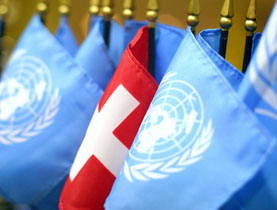Neutrality remains a core principle

Switzerland is a neutral state and neutrality is one of the most important principles of Swiss foreign policy.
Neutrality means that a state does not take part in armed conflict. However, that does not prevent Switzerland from carrying out humanitarian work in war and conflict situations.
Switzerland has been neutral since 1516. One year earlier the troops of the confederation were active in armed conflict for the last time. The French emerged victorious from the Battle of Marignano while the Swiss had to accept a bitter defeat.
In the year following the battle Switzerland concluded a groundbreaking peace deal with France, which ultimately became the starting point of Swiss neutrality.
Future conflicts were to be resolved by arbitration. On the basis of this accord with France Switzerland lived in peace for almost 300 years. It was only in 1798, when French troops marched into the country, that the Swiss were forced temporarily to abandon neutrality.
The great powers of Europe officially recognised Swiss neutrality for the first time in the Treaty of Paris on November 20, 1815. The empires of Austria, Britain, Portugal, Prussia and Russia accepted that Switzerland henceforth wished to avoid all military engagement. The powers furthermore guaranteed the territorial inviolability of Switzerland.
Enshrined in international law
The right to neutrality is recognised in international law. In the Hague Convention of 1907 the rights and obligations of neutral states were confirmed in writing for the first time. Alongside the right to non-participation in wars, neutral countries retain the right to self-defence.
The inviolability of territory is also a right. Neutrality is not mentioned in the Swiss constitution as a national objective. But it is mentioned in the duties of the parliament. “[Parliament] …shall take measures to ensure external security, independence and the neutrality of Switzerland.”
Constant, active and armed
In the course of history Swiss neutrality has taken on different forms and characteristics. In the face of international conflicts the question regularly arises how Switzerland should act. What does active and armed neutrality mean in practice?
After the end of the First World War Switzerland joined the League of Nations and was prepared to support economic sanctions. At the beginning of the Second World War Switzerland strengthened its neutrality by mobilising its army, thereby signalling its willingness to defend its territory.
Neutrality in changing times
In the wake of the Second World War the government defined neutrality as a form of solidarity. That meant that Switzerland could take part in peace promotion activities abroad.
In 1953, for example, Swiss troops were on the ground monitoring the ceasefire between North and South Korea. After the Cold War the government adapted the concept of neutrality to the changed circumstances of external and security politics.
The Swiss government began to put a greater emphasis on cooperation. The government decided that Swiss involvement in Nato’s Partnership for Peace programme was compatible with neutrality because there was no question of joining the military alliance or providing military support in the event of conflict.
Nor do the Swiss authorities see potential membership of the European Union as a problem for their neutrality policy as long as the EU has no binding obligation for all members to provide military assistance.
But just as Swiss neutrality was freely chosen, it can also be given up. In this sense neutrality is not defined as permanent, rather as continuous.
Following the UN line
During more recent conflicts in Iraq and Yugoslavia, the government has had to judge how far Swiss involvement can go within the confines of neutrality. Should Switzerland support economic sanctions? Are overflights allowed? Can army personnel be sent on peacekeeping duties in conflict zones? The stance of the United Nations serves as a key reference point in the evaluation of these questions.
Where military operations take place without a UN mandate, such as the Nato bombardment of Serbia and Montenegro in 1999, Switzerland remains strictly neutral. That means overflight rights for military planes are not granted. On the other hand, participation in humanitarian actions is not prevented.
Where a UN mandate is in place, Switzerland grants transit rights, however not for military actions, but only for humanitarian transport. Switzerland follows the same line for sanctions, only participating in UN-imposed embargos, such as against Iraq in 1991.
Since 1516, following its defeat at the battle of Marignano, near Milan in Italy, Switzerland has had de facto neutral status.
Swiss neutrality was officially recognized by European powers in 1815 in the Treaty of Paris.
As a neutral state Switzerland cannot enter military alliances unless it is attacked. Its forces can only be used for self-defence and internal security. It cannot take sides in international conflicts and cannot give right of transit to foreign forces.
But neutrality does not prevent Switzerland from supporting humanitarian efforts in conflict situations worldwide.

In compliance with the JTI standards
More: SWI swissinfo.ch certified by the Journalism Trust Initiative








You can find an overview of ongoing debates with our journalists here . Please join us!
If you want to start a conversation about a topic raised in this article or want to report factual errors, email us at english@swissinfo.ch.